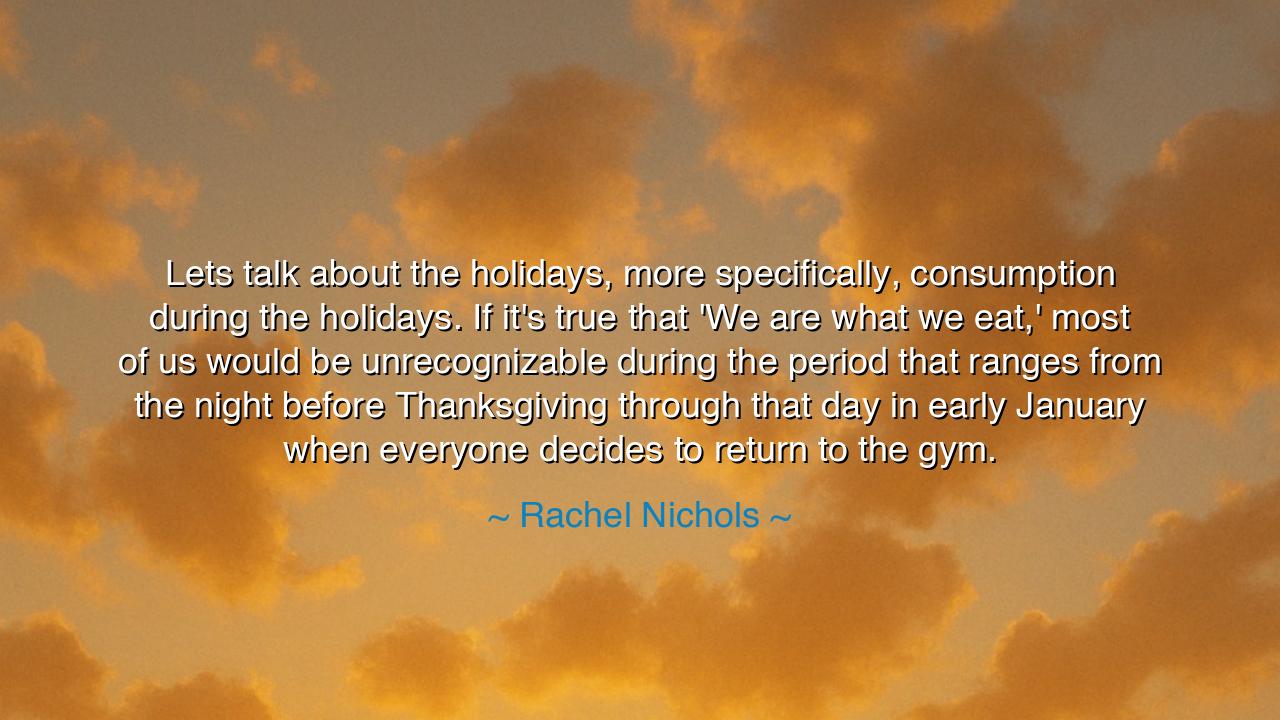
Lets talk about the holidays, more specifically, consumption
Lets talk about the holidays, more specifically, consumption during the holidays. If it's true that 'We are what we eat,' most of us would be unrecognizable during the period that ranges from the night before Thanksgiving through that day in early January when everyone decides to return to the gym.






Rachel Nichols, in her keen and witty observation, declares: “Let’s talk about the holidays, more specifically, consumption during the holidays. If it’s true that ‘We are what we eat,’ most of us would be unrecognizable during the period that ranges from the night before Thanksgiving through that day in early January when everyone decides to return to the gym.” At first, her words provoke laughter, yet within them is woven a deeper truth about excess, discipline, and the human tendency to lose balance during times of celebration. She speaks not only of food but of the spirit of overindulgence that often accompanies the holiday season.
The origin of this reflection lies in the reality of modern festivities, where the holidays have become synonymous with endless tables of feasting. What begins with the bounty of Thanksgiving, continues through the sweets of Christmas, the champagne of New Year’s Eve, and only concludes when, chastened by indulgence, people flood the gyms in January. Nichols’ playful remark reminds us that during these weeks, our very identities seem to shift—we are no longer defined by moderation, but by the excesses of appetite and the fleeting justifications we offer ourselves.
History itself testifies to this cycle. The ancient Romans celebrated Saturnalia, a winter festival of feasting, drinking, and revelry. During this time, masters and slaves ate together, and indulgence was not only permitted but encouraged. Yet after the festival, Roman society returned to its strict hierarchies and routines. Nichols’ modern reflection mirrors this timeless pattern: humans swing between indulgence and restraint, between the ecstasy of celebration and the resolve of self-control.
There is also a deeper moral lesson hidden in her jest. Food is never merely food—it is symbolic of how we treat our bodies, our communities, and our time. To indulge occasionally in joy is no sin, but to lose ourselves completely in consumption is to forget the sacred balance of life. Nichols draws our attention to how easily the human spirit justifies imbalance: we gorge in December, only to punish ourselves in January, as though discipline were a debt rather than a way of living.
Consider the story of Benjamin Franklin, who often wrote about moderation as the secret of health and virtue. He warned against the dangers of gluttony, not because feasting was evil, but because habitual overindulgence dulls the mind and weakens the will. Franklin himself attended grand dinners, but he believed that wisdom lay in mastering the feast, not in being mastered by it. Nichols, in her modern voice, points toward this same truth: the holidays should enrich us, not reduce us to caricatures of excess.
The lesson for future generations is clear: rejoice in the feast, but do not lose yourself within it. Gratitude is the heart of Thanksgiving, not the heaviness of the stomach. Togetherness is the spirit of Christmas, not the overconsumption of sweets. Renewal is the meaning of the New Year, not merely the desperate rush back to the gym. If we allow consumption to overshadow meaning, then the holidays, meant to uplift the soul, become chains upon the body.
Practical wisdom flows from this teaching: approach the holidays with mindfulness. Partake of the feast, but eat with gratitude, not with greed. Share abundance with the hungry, so that joy is multiplied rather than hoarded. Balance feasting with walking, gratitude with generosity, indulgence with discipline. In doing so, one will not only preserve health but also honor the deeper spirit of the season.
Thus, Rachel Nichols’ words, though clothed in humor, carry the tone of ancient wisdom. They remind us that we must not let consumption consume us. Celebrate, but remember the essence of celebration. Feast, but remember balance. For in the end, it is not the food that defines us, but the spirit with which we eat, give thanks, and live. Let this truth be passed on: that moderation, seasoned with gratitude, makes every feast eternal.






AAdministratorAdministrator
Welcome, honored guests. Please leave a comment, we will respond soon